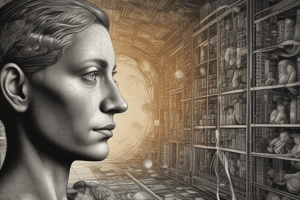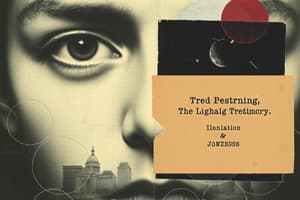Podcast
Questions and Answers
What is a factor that can influence a person's perception of an event?
What is a factor that can influence a person's perception of an event?
- The lighting in the room
- Their knowledge of sports
- Their expectations and beliefs (correct)
- Their racial identity
What is an example of an estimator variable that can affect witness accuracy?
What is an example of an estimator variable that can affect witness accuracy?
- Physical disguise (correct)
- Flashbulb memory
- Exposure time
- Own race bias
What is the term for the tendency for people to have difficulty identifying people of another race?
What is the term for the tendency for people to have difficulty identifying people of another race?
- Own cultural bias
- Own age bias
- Own gender bias
- Own race bias (correct)
What is the phenomenon where people remember the circumstances surrounding a significant event?
What is the phenomenon where people remember the circumstances surrounding a significant event?
What is one potential reason for the own race bias?
What is one potential reason for the own race bias?
What is an example of a study that demonstrated the own race bias?
What is an example of a study that demonstrated the own race bias?
What is the primary purpose of eyewitness testimony in court?
What is the primary purpose of eyewitness testimony in court?
What is the difference between recall memory and recognition memory?
What is the difference between recall memory and recognition memory?
What are estimator variables in the context of eyewitness memory?
What are estimator variables in the context of eyewitness memory?
What is the primary concern of psychologists regarding eyewitness memory?
What is the primary concern of psychologists regarding eyewitness memory?
What is the purpose of discussing the false/repressed memory debate in the context of eyewitness testimony?
What is the purpose of discussing the false/repressed memory debate in the context of eyewitness testimony?
What is the primary goal of the lecture on eyewitness testimony?
What is the primary goal of the lecture on eyewitness testimony?
What is the key difference between system variables and estimator variables?
What is the key difference between system variables and estimator variables?
What is the significance of the Wells, Lindsay, and Ferguson (1979) study in the context of eyewitness testimony?
What is the significance of the Wells, Lindsay, and Ferguson (1979) study in the context of eyewitness testimony?
What percentage of participants recalled a fictitious hot-air balloon ride in a false memory research study?
What percentage of participants recalled a fictitious hot-air balloon ride in a false memory research study?
What is the Yerkes-Dodson law related to in the context of eyewitness testimony?
What is the Yerkes-Dodson law related to in the context of eyewitness testimony?
What was the topic of the fake print advertisement shown to participants in a false memory research study?
What was the topic of the fake print advertisement shown to participants in a false memory research study?
According to the Easterbrook hypothesis, what happens to memory for central and peripheral details with high arousal?
According to the Easterbrook hypothesis, what happens to memory for central and peripheral details with high arousal?
According to Loftus, what may therapists sometimes do to their patients?
According to Loftus, what may therapists sometimes do to their patients?
What is the name of the effect where the presence of a weapon impairs a witness' ability to identify a culprit?
What is the name of the effect where the presence of a weapon impairs a witness' ability to identify a culprit?
What percentage of women did not report any childhood sexual abuse in a study by Williams (1994)?
What percentage of women did not report any childhood sexual abuse in a study by Williams (1994)?
In the study by Loftus et al. (1987), what was the independent variable?
In the study by Loftus et al. (1987), what was the independent variable?
What is the term for the delay between witnessing an event and giving a statement, which can affect memory?
What is the term for the delay between witnessing an event and giving a statement, which can affect memory?
What is a possible explanation for why some people may not report memories of childhood abuse?
What is a possible explanation for why some people may not report memories of childhood abuse?
Who wrote the book 'The Courage to Heal'?
Who wrote the book 'The Courage to Heal'?
What is the term for the phenomenon where exposure to incorrect information about an event after it has occurred causes people to incorporate this misinformation into their memories?
What is the term for the phenomenon where exposure to incorrect information about an event after it has occurred causes people to incorporate this misinformation into their memories?
Who is credited with the research on the misinformation effect?
Who is credited with the research on the misinformation effect?
What is a common debate in the context of repressed memories?
What is a common debate in the context of repressed memories?
What is the term for the questioning techniques used by the police that can affect eyewitness accuracy?
What is the term for the questioning techniques used by the police that can affect eyewitness accuracy?
What is the main argument of McNally and Geraerts' alternative perspective?
What is the main argument of McNally and Geraerts' alternative perspective?
What is one implication of the misinformation effect on eyewitness testimony?
What is one implication of the misinformation effect on eyewitness testimony?
Which of the following is a factor that can increase susceptibility to the misinformation effect?
Which of the following is a factor that can increase susceptibility to the misinformation effect?
What is a limitation of research on the misinformation effect?
What is a limitation of research on the misinformation effect?
What is the main takeaway from the study of eyewitness testimony?
What is the main takeaway from the study of eyewitness testimony?
What is the controversy surrounding the application of research on eyewitness issues to the courts?
What is the controversy surrounding the application of research on eyewitness issues to the courts?
What is the term for the variables that can be manipulated after the fact to impact witness accuracy?
What is the term for the variables that can be manipulated after the fact to impact witness accuracy?
What can lead to the incorporation of incorrect information into a witness's memory for an event?
What can lead to the incorporation of incorrect information into a witness's memory for an event?
Flashcards are hidden until you start studying
Study Notes
Background
- Eyewitness testimony is commonly used as evidence in court and is one of the most persuasive forms of evidence for juries (Wells, Lindsay, & Ferguson, 1979).
- Eyewitness memory is typically assessed in two ways: recall memory and recognition memory.
- Recall memory involves reporting details of a previously witnessed event or person.
- Recognition memory involves reporting whether what is currently being viewed or heard is the same as the previously witnessed person or event of interest.
Estimator Variables and System Variables
- There are two types of factors that can affect eyewitness memory: estimator variables and system variables.
- Estimator variables are present at the time of the crime and cannot be changed.
- System variables can be manipulated after the fact and impact the accuracy of witnesses.
Estimator Variables
- Many features of an event can influence a person's perception, such as exposure time, lighting, distance, physical disguise, and distraction.
- Witnesses can view the same thing and perceive it differently due to different expectations, beliefs, and current knowledge.
- Context can affect our perception of events, and there is an own race bias, where people have difficulty identifying people of another race.
- "Flashbulb memory" is a vivid memory of a specific event, and emotional level can affect memory, with optimal memory at an optimal level of arousal.
- The Easterbrook hypothesis states that highly aroused witnesses have better memory for central details than peripheral details.
- The weapons focus effect states that the presence of a weapon draws attention and impairs a witness' ability to identify a culprit.
System Variables
- The delay between witnessing an event and giving a statement can affect memory.
- Questioning techniques used by the police can affect eyewitness accuracy, and the misinformation effect can cause people to incorporate incorrect information into their memories.
Misinformation Effect
- The misinformation effect is a phenomenon where people incorporate incorrect information into their memories after being exposed to it.
- Research by Elizabeth Loftus (1975) demonstrated the misinformation effect, where participants who were asked leading questions later incorporated incorrect information into their memories.
False Memory Research
- Research by Wade et al. (2002) showed that participants can be convinced of false memories through repeated interviews and suggestive questioning.
- Research by Braun et al. (2002) showed that participants can be convinced of false memories through suggestive advertising.
Repressed / False Memories
- There is a debate about whether repressed memories are real or false, with some arguing that therapists can implant false memories in patients.
- Others believe that memories can be repressed and later recovered through therapy.
Implications of the Misinformation Effect
- The misinformation effect has implications for the credibility of eyewitness testimony, as questioning techniques can affect the accuracy of witness memories.
- Factors that increase susceptibility to the misinformation effect include age, hypnosis, suggestibility, credible source of misinformation, repetition of misinformation, and peripheral misinformation.
Studying That Suits You
Use AI to generate personalized quizzes and flashcards to suit your learning preferences.




